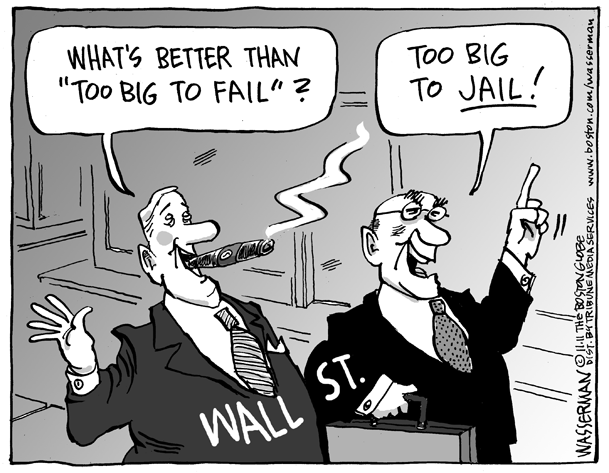Too Big To Jail
The SNC-Lavalin affair has embroiled the Trudeau administration in an ever rising tide of apparent scandal. Former attorney general Jody Wilson-Raybould has testified under oath that key members of the Trudeau cabinet pressured her to pursue financial penalties instead of criminal charges for SNC-Lavalin’s briberies. The suspected bribery of the Libyan government by SNC-Lavalin is no doubt worthy of criminal conviction, and likely would have been pursued as such without question if the act had been committed by an individual, not a large company. But is this recent scandal really as explosive as it seems to be?
Politicians, lobbyists and executives have worked hard to ensure that the punishment of white collar crime almost always goes toward financial penalties over criminal conviction. If the SNC-Lavalin affair had happened in the US, it barely would have made headlines. A major shift has taken place in the prosecution procedures of white collar crime in the US and around the world. The SNC-Lavalin affair shows that Canada has come to join other world powers in using this new procedure. Surprisingly, the motivation behind politicians and prosecutors shifting to more lenient punishment is largely economic. How does economics play into the SNC-Lavalin affair? Let’s dive a little deeper and find out.
Back in 2012, HSBC, the world’s 7th largest bank, was convicted of laundering hundreds of billions of dollars for Mexican drug cartels, doing the same for terrorists, and violating sanctions by doing business with pariah states. This had been going on for years before the issue was discovered, insinuating that HSBC executives had been aware of their wrongdoings for quite some time. The world waited as it seemed that criminal conviction would be inevitable; what came instead was a deferred-prosecution agreement. HSBC would admit it’s wrongdoing, promise to change its behavior, and pay a fine. The two billion dollar fine levied against them might seem enormous, but it was equivalent to only a month of the firm’s profits. The US government, in collaboration with the UK, decided it would be too costly to indict HSBC. In other words, they were “too big to jail.” Governments feared that the prosecution of HSBC would lead to thousands of job losses around the world, and a ripple effect that would be felt by economies everywhere.
The fear of sparking an economic downturn has spread amongst lawmakers like wildfire ever since the fall and eventual bankruptcy of major accounting firm Arthur Andersen back in 2001. When the Enron scandal came to an end in the early 2000s, its accounting firm Arthur Andersen was charged with manipulating its finances. Once indicted, Arthur Andersen lost its accounting license and subsequently all its clients. Thousands of accountants, lawyers and professionals lost their jobs. The ripple effect killed service businesses around Arthur Andersen’s offices and hurt those that Arthur Andersen had worked with. It was this incident that gave birth to infamous deferred-prosecution agreements and financial penalties for corporations. Businesses deemed too big to fail are given fines instead of convictions so that mass layoffs can be avoided. An especially well-known instance of this is the aftermath of the 2008 financial crisis. Not a single individual or institution associated with the trade of mortgage-backed securities was prosecuted. Banks were bailed out, fines were levied, and that was the end of the story.
This culture of lax punishment for UK and US based corporations has been in place, as said before, since the fall of Arthur Andersen in 2001. But Canada has more recently come to cuddle-up with this idea of deferred-prosecution. SNC-Lavalin employs some nine-thousand people across Canada. If criminal prosecution were to be the route the justice department takes, it is very likely SNC-Lavalin could be banned from Canadian government contracts for 10 years. As an engineering firm that relies primarily on public building projects across Canada, this loss of project opportunities would result in the company having to lay off employees, possibly into the thousands. The question Trudeau is facing right now is one world leaders have been facing for decades: will a criminal indictment against a large corporation result in ultimately harming the innocent, non-decision making employees? And will that start a chain reaction of economic hardship for everyone around them? These questions need to be taken seriously, and I believe that the Trudeau administration is not wholly evil for pushing for financial penalties in order to save thousands of Canadian jobs. However, I do believe executives can and should be separated from the entities they work for in situations such as these. The idea that an executive cannot be individually prosecuted without bringing down the business with them has no merit and stands to be the epitome of corruption in our time. So, Trudeau, show the rest of the world how it’s done and single out the executives for their intentional misconduct while at the same time saving their employees.

